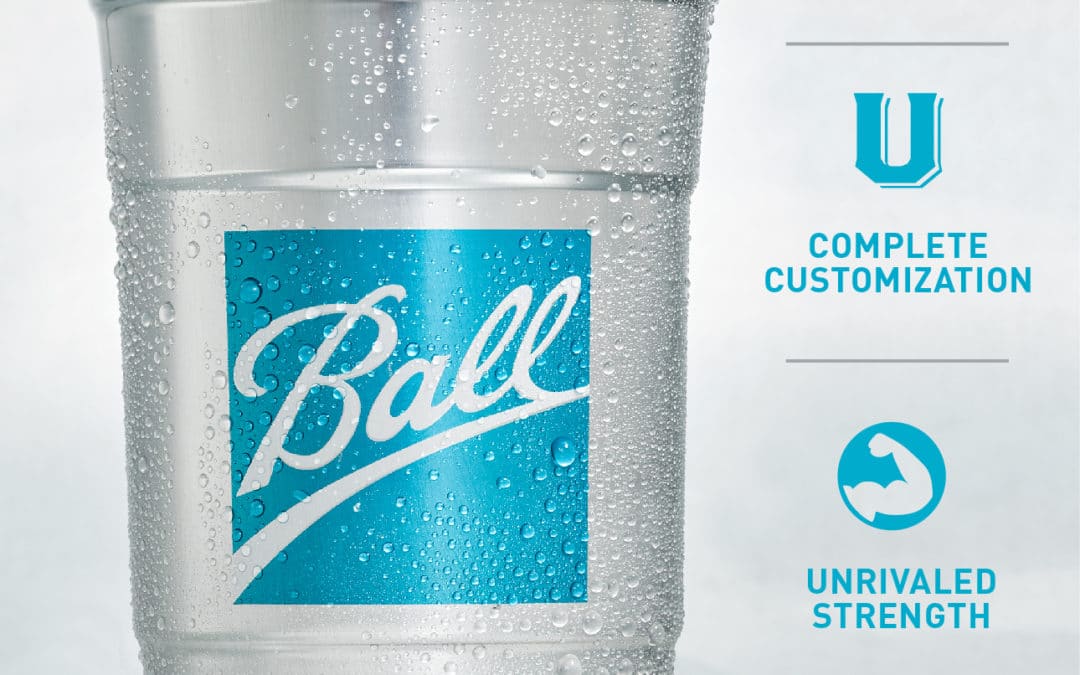PR / USA (April, 2020) – “We are honored that Fast Company recognized the Ball Aluminum Cup™ as a world changing idea,” said Daniel W. Fisher, senior vice president and chief operating officer, Global Beverage Packaging. “We designed the cup to provide consumers with a better, more sustainable way to enjoy their favorite beverages while helping to alleviate pollution associated with single-use plastic cups. We look forward to ramping up production of the aluminum cup later this year and eventually expanding its adoption to bars, breweries and retail locations across the United States.”
Ball, an established leader in sustainable aluminum packaging solutions for beverage, personal care and household products, launched the U.S. pilot of its infinitely recyclable aluminum cups in September 2019. In response to growing consumer demand for sustainable products, Ball identified an opportunity to create an innovative alternative to plastic cups. Just like an aluminum can (which has a global recycling rate of 69 percent), the aluminum cup can be recycled an infinite number of times without losing quality. In fact, 75 percent of aluminum ever produced is still in use today. Lightweight, sturdy and cool to the touch, the aluminum cup offers consumers a better beverage drinking experience and is a game changer for major entertainment venues and concessionaires looking to be more sustainable.
A limited supply of aluminum cups are being produced through 2020 for use in areas where plastic cups are common, including entertainment venues and major concessionaires. The aluminum cup has been available to consumers at venues across the country, including the Pepsi Center, Mercedes Benz Stadium and Hard Rock Stadium. In October, Ball broke ground on its first dedicated aluminum cups manufacturing facility in Rome, Ga.
A full list of the 2020 Fast Company winners can be found here. For more information about the Ball Aluminum Cup™, visit www.ball.com/cups.
About Ball Corporation
Ball Corporation supplies innovative, sustainable aluminum packaging solutions for beverage, personal care and household products customers, as well as aerospace and other technologies and services primarily for the U.S. government. Ball Corporation and its subsidiaries employ more than 18,300 people worldwide and reported 2019 net sales of $11.5 billion. For more information, visit www.ball.com, or connect with us on Facebook or Twitter.
Related: Ball Corporation Achieves Global First With Aluminum Sustainability Certification
intentionally blank
Forward-Looking Statements
This release contains “forward-looking” statements concerning future events and financial performance. Words such as “expects,” “anticipates,” “estimates,” “believes,” “targets,” “likely,” “positions” and similar expressions typically identify forward-looking statements, which are generally any statements other than statements of historical fact. Such statements are based on current expectations or views of the future and are subject to risks and uncertainties, which could cause actual results or events to differ materially from those expressed or implied. You should therefore not place undue reliance upon any forward-looking statements and any such statements should be read in conjunction with, and, qualified in their entirety by, the cautionary statements referenced below. The company undertakes no obligation to publicly update or revise any forward-looking statements, whether as a result of new information, future events or otherwise. Key factors, risks and uncertainties that could cause actual outcomes and results to be different are summarized in filings with the Securities and Exchange Commission, including Exhibit 99 in our Form 10-K, which are available on our website and at www.sec.gov. Additional factors that might affect: a) our packaging segments include product capacity, supply, and demand constraints and fluctuations; availability/cost of raw materials and logistics; competitive packaging, pricing and substitution; changes in climate and weather; footprint adjustments and other manufacturing changes, including the startup of new facilities and lines; failure to achieve synergies, productivity improvements or cost reductions; mandatory deposit or other restrictive packaging laws; customer and supplier consolidation; power and supply chain interruptions, including due to virus and disease outbreaks; potential delays and tariffs related to the U.K’s departure from the EU; changes in major customer or supplier contracts or a loss of a major customer or supplier; political instability and sanctions; currency controls; changes in foreign exchange or tax rates; and tariffs, trade actions, or other governmental actions, including business restrictions and shelter-in-place orders in any country affecting goods produced by us or in our supply chain, including imported raw materials, such as those related to COVID-19 and those pursuant to Section 232 of the U.S. Trade Expansion Act of 1962 or Section 301 of Trade Act of 1974; b) our aerospace segment include funding, authorization, availability and returns of government and commercial contracts; and delays, extensions and technical uncertainties affecting segment contracts; c) the company as a whole include those listed plus: the extent to which sustainability-related opportunities arise and can be capitalized upon; changes in senior management, succession, and the ability to attract and retain skilled labor; regulatory action or issues including tax, environmental, health and workplace safety, including U.S. FDA and other actions or public concerns affecting products filled in our containers, or chemicals or substances used in raw materials or in the manufacturing process; technological developments and innovations; the ability to manage cyber threats and the success of information technology initiatives; litigation; strikes; disease; pandemic; labor cost changes; rates of return on assets of the company’s defined benefit retirement plans; pension changes; uncertainties surrounding geopolitical events and governmental policies both in the U.S. and in other countries, including policies, orders and actions related to COVID-19, the U.S. government elections, budget, sequestration and debt limit; reduced cash flow; interest rates affecting our debt; and successful or unsuccessful joint ventures, acquisitions and divestitures, and their effects on our operating results and business generally.

